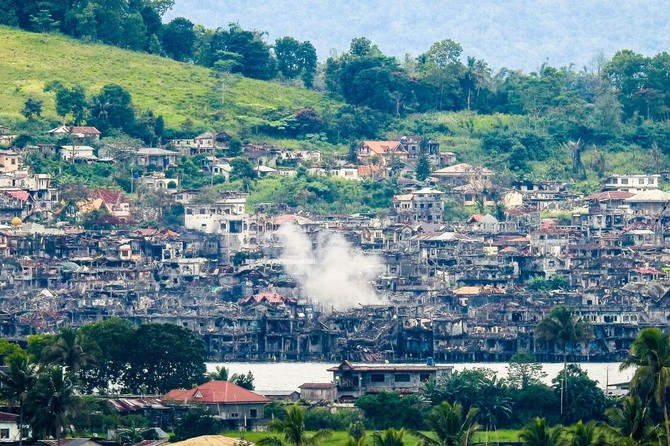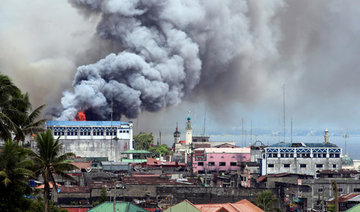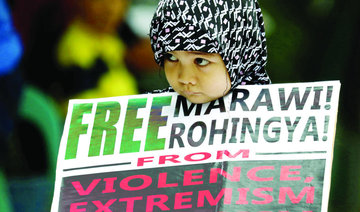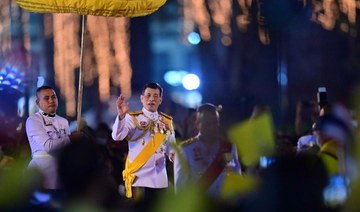MARAWI, Philippines: Philippine President Rodrigo Duterte on Tuesday declared a southern city “liberated from terrorists” after a five-month battle against militants loyal to the Daesh group.
Duterte made the declaration in a rain-soaked speech to troops in Marawi where they have been fighting the militants in clashes that have claimed more than 1,000 lives and displaced 400,000 people.
“Ladies and gentlemen, I hereby declare Marawi liberated from the terrorists,” Duterte said, speaking moments just after explosions and gunfire were heard in the city.
Duterte’s announcement came just hours after the military said it was still hunting down 20 to 30 fighters in the battle zone, including Malaysian militant leader Mahmud Ahmad.
On Monday, the military claimed a major breakthrough when it announced the death of Isnilon Hapilon, said by Duterte and security analysts to be the leader of an IS bid to declare a Southeast Asian caliphate as they suffer battlefield defeats in Iraq and Syria.
Philippines’ Duterte says city ‘liberated’ after siege
Philippines’ Duterte says city ‘liberated’ after siege

Arab designers steal the spotlight in Cannes

DUBAI: As the curtain rose on the 77th edition of the Cannes Film Festival, Arab designers once again stole the spotlight in the glamorous French Riviera setting.
Stars from around the globe are descending upon Cannes for the much-awaited 10-day cinematic celebration. The festival kicked off with the premiere of the film “The Second Act.”
Shanina Shaik, the Australian-born model of Saudi, Pakistani, and Lithuanian descent, graced the opening night red carpet in a head-turning scarlet dress by Lebanese couturier Zuhair Murad. Her strapless gown, featuring a sweetheart neckline and a dramatic overskirt, was from the designer’s ready-to-wear Fall 2024 collection.
Shaik was not the only star on the red carpet championing an Arab designer.
US German model and TV host Heidi Klum stunned on the red carpet in a bold red gown by Lebanese designer Saiid Kobeisy. The dress gathered at the waist, revealing one leg, with silk fabric draping around her.
Meanwhile, US actress Jane Fonda donned a black jumpsuit adorned with crystal embroidery from Lebanese designer Elie Saab’s Fall 2019 collection. Completing her look, she opted for a leopard-print overcoat.
“The Second Act” is a French comedy starring Lea Seydoux, Vincent Lindon, Louis Garrel and Raphaël Quenard. They play squabbling actors filming a movie directed by artificial intelligence.
The festival’s first lengthy standing ovation, though, went to Streep, who was awarded an honorary Palme d’Or during Tuesday’s opening ceremony. After Juliette Binoche introduced her, Streep shook her head, fanned herself and danced while the crowd thunderously cheered.
“I’m just so grateful that you haven’t gotten sick of my face and you haven’t gotten off of the train,” said Streep, who soon thereafter declared Cannes officially open with Binoche.
‘Voice for the Voiceless’: Islamabad Police signs MoU to set up welfare service for stray animals

- Police Animal Welfare Services will ensure treatment and rehabilitation of abandoned, injured and sick animals
- The project will also include a shelter home, pet café and a hotel to help the residents of the city who plan to travel
ISLAMABAD: In a unique development for Pakistan, Islamabad Capital Territory (ICT) Police on Monday announced the signing of a memorandum of understanding (MoU) with an animal rescue organization to establish Police Animal Welfare Services (PAWS) aimed at ensuring the timely treatment and rehabilitation of abandoned, injured and sick animals.
The development follows the decision taken by Inspector General of Police Syed Ali Nasir Rizvi to start an initiative called the Voice for the Voiceless to help lost and stray animals. Islamabad has faced issues with stray dogs and cats, and there has been controversy surrounding the methods used to manage them, particularly the practice of culling by the Capital Development Authority (CDA).
Residents of the city also spot wildlife such as wild boars, leopards and monkeys occasionally due to their proximity with Margalla Hills, which boast thick vegetation and a diverse ecosystem.
The ICT Police mentioned the MoU signing with the JFK Animal Rescue and Shelter Organization in its statement to develop its capacity to help these creatures.
“The project includes establishment of a shelter home, a pet cafe, and a pet hotel for these animals, where citizens who travel or go on long journeys can avail these facilities for their pet where the best care of these animals will be ensured through professional caretakers,” the statement said.
“Moreover, this center will be built on most modern lines and international standards,” it continued. “Under PAWS, a K-9 mission will also be organized for the K-9 unit dogs of Islamabad Police, where, after retirement, these dogs will be handed over to citizens for complete care. Further assistance will be sought from other animal welfare organizations as needed.”
Rizvi said on the occasion that the initiative would echo the message of love and care for animals, as they were important to the environment, nature and human life.
He also noted that animals retiring after serving a force should not be put down, adding their complete care should be ensured.
Police forces around the world often engage in social responsibility ventures, though the nature and extent of these activities can vary widely depending on the country, local policies and community needs.
Pakistani politicians acknowledge Dubai properties revealed in data leak, say all assets duly declared

- Dubai Unlocked investigative project has revealed Pakistanis own residential properties worth $11 billion in Dubai
- UAE working in recent years to tighten legislation, increase cooperation with foreign law enforcement on extradition
ISLAMABAD: Top Pakistani politicians have dismissed a new leak of records that has revealed residential properties worth around $11 billion owned by the country’s political, military and business elite in Dubai, saying all mentioned assets had been legally declared.
Dubai Unlocked, an investigative project involving more than 70 media outlets around the globe, has revealed the ownership of properties in the Emirate of prominent global figures, including alleged money launderers and drug lords, political figures accused of corruption and their associates, and businessmen sanctioned for financing terrorism, among others.
The data spans 2020 and 2022 and only includes residential properties.
Pakistanis listed in leaks include President Asif Ali Zardari’s three children, former Prime Minister Nawaz Sharif’s son Hussain Nawaz Sharif, Interior Minister Mohsin Naqvi’s wife, Sindh provincial minister Sharjeel Memon and family members, Senator Faisal Vawda, Pakistan Tehreek-e-Insaf lawmaker Sher Afzal Marwat, and half a dozen lawmakers from the Sindh and Balochistan assemblies.
The Pakistani list also features the late Gen (retired) Pervez Musharraf, former prime minister Shaukat Aziz, former army chief Qamar Javed Bajwa’s son, and more than a dozen retired army generals as well as a police chief, an ambassador and a scientist, all of whom owned properties either directly or through their spouses and children.
Pakistani politicians and others were last named in the 2016 Panama Papers, leaked documents that showed how the rich exploit secretive offshore tax regimes.
“What is the new thing here,” Defense Minister Khawaja Muhammad Asif said on X, dismissing the leaks and saying all those named in the data were already known to have properties abroad.
Explaining his position on the issue, Pakistan’s interior minister Mohsin Naqvi said the Dubai property bought in his wife’s name in 2017 was fully declared and listed in tax returns.
“It was also declared in returns submitted to the Election Commission as caretaker CM [chief minister] of Punjab,” he said in an X post. “The property was sold a year ago, and a new property was purchased recently with the proceeds.”
Pakistan Tehreek-e-Insaf (PTI) lawmaker and ex-PM Imran Khan aide, Sher Afzal Marwat, admitted he owned an apartment in Dubai, but had declared it with authorities in Pakistan, including the Federal Board of Revenue and the Election Commission of Pakistan.
“It can be confirmed with both the FBR and as well as ECP,” he said.
President Zardari’s Pakistan Peoples Party also said the properties of its leaders in Dubai had been duly declared in tax returns.
The property records at the heart of the Dubai Unlocked project come from multiple data leaks, mostly from the Dubai Land Department, as well as publicly owned utility companies. Taken together, the data provides a detailed overview of hundreds of thousands of properties in Dubai and information about their ownership or usage.
The data was obtained by the Center for Advanced Defense Studies (C4ADS), a non-profit organization based in Washington that researches international crime and conflict. It was then shared with Norwegian financial outlet E24 and the Organized Crime and Corruption Reporting Project (OCCRP), which coordinated an investigative project with dozens of media outlets from around the world.
The UAE was dealt a major reputational blow in March 2022 when it was flagged by global watchdog, the Financial Action Task Force (FATF), for “deficiencies” in its systems to combat money laundering and terror financing.
The move, which threatened to tarnish Dubai’s reputation as a premier center of finance, sparked a concerted effort by UAE authorities to tighten legislation and increase cooperation with foreign law enforcement on extradition.
India’s Modi denies stoking Hindu-Muslim divisions to win election, files nomination

- Modi began campaign by showcasing his economic record, governance and popularity
- Changed tack after the first phase to accuse opposition Congress of being pro-Muslim
NEW DELHI: Indian Prime Minister Narendra Modi defended himself against criticism that he is stoking divisions between Hindus and Muslims to win national elections as he filed his nomination on Tuesday for re-election from one of Hinduism’s holiest cities.
India began voting April 19 in the seven-phase election in which Modi, 73, is seeking to be the second prime minister to win a third straight term since independence leader Jawaharlal Nehru.
Although Modi began his campaign by showcasing his economic record, governance and popularity, he has changed tack after the first phase to accuse the main opposition Congress party of being pro-Muslim.
Analysts say this was likely aimed at firing up the base of his Hindu nationalist Bharatiya Janata Party after a low turnout in the first phase sparked doubts that BJP and its allies could win the landslide that the party sought.
“I believe people of my country will vote for me,” Modi told broadcaster CNN-News18 in Varanasi, his parliamentary constituency in the northern state of Uttar Pradesh.
“The day I start talking about Hindu-Muslim (in politics) will be the day I lose my ability to lead a public life,” Modi said, speaking in Hindi. “I will not do Hindu-Muslim. That is my resolve.”
Modi’s critics often accuse him and BJP of targeting minority Muslims to please their hard-line voters, which he and the party deny.
While Hindus make up about 80 percent of India’s 1.4 billion people, it also has the world’s third-largest Muslim population of about 200 million.
Congress has complained to the Election Commission that Modi made “deeply objectionable” comments about Muslims in an April 21 speech, violating poll rules. The commission has sought a response from the BJP on the complaint.
In that speech, Modi accused Congress of planning to do a wealth concentration survey, seize properties and redistribute them, which Congress has denied.
He said at the time:
“During their (Congress) previous government, they said that Muslims have the first right on the wealth of the nation. That means, who will they redistribute this wealth to? They will give it those who have more children, to infiltrators.”
On Tuesday, Modi said he did not name any community in that speech, even as he continued to focus on the theme.
“I have neither said Hindu or Muslim. I have said you should have as many children as you can support,” Modi said.
Detained Thai monarchy reform activist dies after hunger strike

- Netiporn Sanesangkhom, was a member of the activist group Thaluwang, known for their bold and aggressive campaigns
- She is the first political activist in Thailand to have died after carrying on a partial hunger strike for 110 days
BANGKOK: A young activist in Thailand who went on a hunger strike after being jailed for advocating reform of the country’s monarchy system died Tuesday in a prison hospital, officials said. The death sparked fresh calls for reviewing the judicial process that allows political offenders accused of nonviolent offenses to be held for extended periods in prison ahead of being tried.
Netiporn “Bung” Sanesangkhom, 28, was a member of the activist group Thaluwang, known for their bold and aggressive campaigns demanding reform of the monarchy and abolition of the law that makes it illegal to defame members of the royal family. The group’s name can be loosely translated as “breaking through the palace,” a reference to its open criticism of Thailand’s monarchy.
She appears to be the first political activist in Thailand to have died after carrying on a partial hunger strike for 110 days while she was awaiting trial.
The Thailand branch of the human rights group Amnesty International described Netiporn’s death as “a shocking reminder that Thai authorities are denying activists their right to temporary release on bail and using detention to silence the peaceful expression of dissent.”
“This is a grim day for Thai society, highlighting the severe judicial harassment and the justice system’s failure to recognize basic human rights,” the group said. “Speaking out should not lead to death; it should inspire change.”
The popular opposition Move Forward party, which has also campaigned for reform of the monarchy, issued a statement saying that people should not be jailed for holding political opinions and that persons accused of political offenses should be granted bail.
Foreign diplomats and ambassadors from the US, UK, Canada, the EU and elsewhere offered their condolences after Netiporn’s death. German Ambassador Ernest Reichel wrote on social platform X: “My wish would be that political disagreements are not taken to such bitter and extreme consequences.”
Thailand’s monarchy until recent years was widely considered an untouchable, bedrock element of Thai nationalism. Criticism of the monarchy was taboo, and insulting or defaming key royal family members remains punishable by up to 15 years in prison under a lese majeste law, usually referred to as Article 112 of Thailand’s Criminal Code.
Student-led pro-democracy protests beginning in 2020 openly criticized the monarchy, leading to vigorous prosecutions under the law, which had previously been relatively rarely employed. Critics say the law is often wielded as a tool to quash political dissent.
The protest movement faded due to government harassment and the coronavirus pandemic, but Netiporn was one of more than 270 activists charged with the royal defamation law since the protests in 2020-21.
Netiporn suffered cardiac arrest early Tuesday morning, and medical teams spent several hours trying to resuscitate her. She was pronounced dead just before noon, according to a statement from the Corrections Department.
She had two charges of lese majeste pending against her, both of them involving conducting polls in public spaces in 2022 asking people’s opinion about the royal family, according to the group Thai Lawyers for Human Rights. Her release on bail was revoked in January due to her participation in a political rally last year.
Netiporn started her hunger strike after she was detained in January. The Corrections Department said she began eating and drinking water again after April 4. However, the human rights lawyer group’s latest update on her condition on April 25 said she was still fasting.
Two fellow jailed activists are also carrying out hunger strikes. Both are Thaluwang members who were also charged with lese majeste for agitating for reform of the monarchy, and they started their hunger strikes about a month after Netiporn.
Netiporn’s lawyers had applied for her to be transferred from the Central Corrections Hospital to Thammasat University Hospital but she was never granted a prolonged stay there for treatment, said her lawyer, Kritsadang Nutcharas. The authorities said they would establish the legal cause of death.
“Does it seem like there’s standard treatment in the Thai justice system when we compare what these kids are going through with their political charges and what some prominent adults have gone through?” Kritsadang said. He was making an apparent reference to former Prime Minister Thaksin Shinawatra, who returned from exile last year to serve a prison term in corruption-related cases but never spent a single night in jail on grounds of ill health.
At a candlelight vigil Tuesday night outside Bangkok’s Criminal Court, another activist facing lese majeste charges, Panusaya “Rung” Sitthijirawattanakul, decried the failure of Prime Minister Srettha Thavisin’s government to ease the plight of political prisoners.
“Do you need someone to die first before you think of doing something?” she said. “How many of us have to die before you start listening to us? We are not people to be scared of. We’re just ordinary people who are asking for something. So this is very brutal.”
Thaluwang has held high-profile protests calling not only for reform of the monarchy, but also changes in the justice system and an end to political persecution through the courts. It has also called for rejection of Thailand’s application to join the UN Human Rights Council.
Thailand announced its bid for a seat on the rights council for the 2025-2027 term after the current government took office last year, seeking to show its commitment to protect human rights. Critics charge that the reality of law enforcement in the country strongly contradicts its ambition to be recognized by the international community as a human rights defender.
Human Rights Watch has raised concerns over “the Thai government’s use of arbitrary arrest and pretrial detention to punish critics of the monarchy for their views,” which it says is a violation of their rights under international human rights law.














